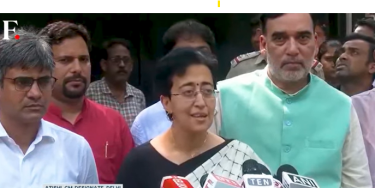
The anti-corruption activist and Chief Minister of Delhi, Arvind Kejriwal, has resigned. He made the unexpected resignation move at a sudden news conference on Tuesday, 17 September 2024, a few days after he was discharged on bail after spending five months behind bars over corruption charges.
Atishi: Delhi's new Chief Minister
Kejriwal’s Aam Aadmi Party (AAP) has collectively decided to replace him with Atishi Marlena Singh, a senior party leader and current State Minister as the chief minister designate. Atishi, 43, will emerge as the youngest chief minister of Delhi besides being only the third woman in the position, which was previously held by Sheila Dikshit of Congress and Sushma Swaraj of BJP.
Atishi was born on 8 June 1981 to professors at Delhi University. Born in the capital city, she graduated in History from St Stephen's College and completed two master’s degrees at Oxford University as a Rhodes Scholar.
Atishi has been associated with AAP since its inception. She had met noted advocate Prashant Bhushan, also one of the founders of the party when Atishi was working with a non-profit organization in Madhya Pradesh. She has held an important position in AAP as a member of the Manifesto Drafting Committee and has played a crucial role in chiselling AAP's policies concerning education and local governance.
Atishi's rise in AAP
Atishi's journey within AAP has been marked with huge contributions and meteoric rise. She was an advisor to then education minister Manish Sisodia during Kejriwal's full first term in 2015. Her contribution to reforms in the education sector occurred when she came up with the 'happiness curriculum', a flagship policy of the AAP government aimed at improving student well-being.
Despite setbacks, such as her removal from an advisory role in 2018 and an unsuccessful bid in the Lok Sabha in 2019, Atishi did not give in. She proved herself by getting elected as an MLA from Kalkaji in 2020 when AAP won a third consecutive term in Delhi and captured 67 of the 70 assembly seats.
As central agencies began probing the liquor policy case, leading to the arrest of several senior AAP leaders, Atishi's role in the party expanded. She was inducted into the cabinet and given charge of 14 portfolios, including Education, Women and Child Welfare, and Public Works.
Atishi was one of the visible leaders of the party when Kejriwal and other senior leaders were behind bars. Several opposition leaders congratulated her including Samajwadi Party president Akhilesh Yadav, who described her as "combative" and "determined".
Kejriwal's decision and future plans
Kejriwal appears to be resigning as part of a strategic plan before the Delhi Assembly polls. The former chief minister has called for an early election, insisting that it will to "allow the people of Delhi to decide if the AAP government is an honest government".
"I got justice from the legal court, now I will get justice from the people's court," Kejriwal told reporters, indicating his intention to seek a "certificate of honesty" from the electorate. He has expressed his willingness to return as chief minister only if re-elected by the people of Delhi.
The corruption case
Kejriwal was arrested, along with several others who are part of AAP, including former deputy CM Manish Sisodia and prominent leader Sanjay Singh, for alleged anomalies in a now-scrapped alcohol sales policy. The party has consistently denied such allegations against Kejriwal and its other leaders and has accused the ruling Bharatiya Janata Party (BJP) of using investigating agencies to target opposition leaders unfairly.
Political implications
AAP is now at a critical point with Kejriwal resigning and Atishi being appointed as the chief minister. The party, which made its electoral debut in 2013 and has subsequently governed the nation's capital, faces the task of restoring trust among its faithful supporters and intensifying its cadre for polls.
Kejriwal will more than likely focus on campaign efforts, carrying out intensive door-to-door campaigning in Delhi and appearances in other states that are slated for election soon, such as Haryana and Jammu and Kashmir. The BJP-the leading opposition party in Delhi-labelled Kejriwal's resignation as a "publicity stunt" to garner sympathy from public opinion. The move by Kejriwal, however, seems to have altered the political landscape in the national capital.
Latest developments
Kejriwal met the Lieutenant Governor of Delhi, V.K. Saxena and formally tendered his resignation on 17 September. During the same meeting, Atishi presented a letter demonstrating MLA support for forming the new government under her leadership. "I will protect the people of Delhi and run the government under Arvind Kejriwal's guidance," Atishi told reporters after the meeting, conceding that "this responsibility lies with me.".
This change of power is likely to occur in the next day or two, and Atishi will be sworn in as the new Chief Minister in the coming days. The Delhi Assembly, whose term will end in February 2025, continues to function with the AAP retaining its majority of 62 seats in the 70-member house.
The Election Commission has not responded to Kejriwal's call for early elections yet. As per Indian law, elections can't normally be scheduled less than six months before the end of an assembly term unless the assembly is dissolved early.




